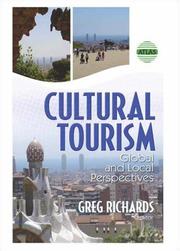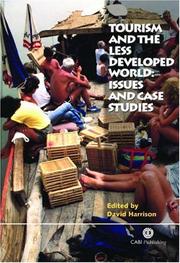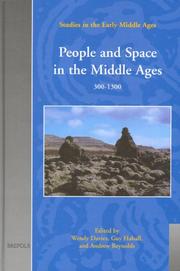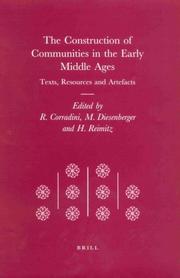| Listing 1 - 5 of 5 |
Sort by
|

ISBN: 0789031175 9780789031174 0789031167 9780789031167 9780203826188 9781136792342 9781136792298 9781136792335 Year: 2007 Publisher: New York, N.Y. Haworth Hospitality Press
Abstract | Keywords | Export | Availability | Bookmark
 Loading...
Loading...Choose an application
- Reference Manager
- EndNote
- RefWorks (Direct export to RefWorks)
Civilisation --- Tourism --- Environmental planning --- Heritage tourism. --- Tourisme culturel --- 379.851.43 --- cultuurtoerisme --- Zuid-Afrika --- Londen --- Spanje --- erfgoedtoerisme --- festivals --- themaroutes --- Portugal --- religieus toerisme --- lokale gemeenschappen --- evenementen --- Porto --- Rotterdam --- stadstoerisme --- toerisme --- cultureel toerisme --- events --- Heritage tourism --- Cultural tourism

ISBN: 0851994334 9786611004279 1281004278 085199704X 0851998305 Year: 2001 Publisher: Wallingford CABI
Abstract | Keywords | Export | Availability | Bookmark
 Loading...
Loading...Choose an application
- Reference Manager
- EndNote
- RefWorks (Direct export to RefWorks)
This multi-author book covers tourism and development issues from less developed societies and countries from around the world, with chapters on specific regions and specific themes that emerge from the interaction of tourism with such societies.
Tourism --- Developing countries --- Tourist trade --- Tourisme --- duurzaam toerisme --- ontwikkelingsgebieden --- derde wereldtoerisme --- Afrika --- Zuid-Amerika --- China --- India --- Zuid-Afrika --- Indonesië --- Cariben --- massatoerisme --- resorts --- sekstoerisme --- lokale gemeenschappen --- ecotoerisme --- 379.851.49 --- Derde Wereldtoerisme, sekstoerisme --- Ecotoerisme --- Geografie --- Sekstoerisme --- Toerisme --- Toerisme en derde wereld --- Economische geografie --- Toerisme Sport Recreatie. --- ontwikkelingslanden --- Ecotoerisme. --- Sekstoerisme. --- Toerisme en derde wereld. --- Afrika. --- China. --- ontwikkelingslanden. --- Ontwikkelingslanden.

ISBN: 9782503515267 2503515266 9782503538648 Year: 2006 Volume: v. 15 Publisher: Turnhout Brepols
Abstract | Keywords | Export | Availability | Bookmark
 Loading...
Loading...Choose an application
- Reference Manager
- EndNote
- RefWorks (Direct export to RefWorks)
This book compares community definition and change in the temperate zones of southern Britain and northern France with the starkly contrasting regions of the Spanish meseta and Iceland. Local communities were fundamental to human societies in the pre-industrial world; crucial in supporting their members and regulating their relationships, as well as in wider society. While geographical and biological work on territoriality is very good, existing archaeological literature is rarely time-specific and lacks wider social context; most of its premises are too simple for the interdependencies of the early medieval world. Historical work, by contrast, has a weak sense of territory and no sense of scale; like much archaeological work, there is confusion about distinctions - and relationships - between kin groups, neighbourhood groups, collections of tenants and small polities.The contributors to this book address what determined the size and shape of communities in the early historic past and the ways that communities delineated themselves in physical terms. The roles of the environment, labour patterns, the church and the physical proximity of residences in determining community identity are also examined. Additional themes include social exclusion, the community as an elite body, and the various stimuli for change in community structure. Major issues surrounding relationships between the local and the governmental are investigated: did larger polities exploit pre-existing communities, or did developments in governance call local communities into being?
Human settlements --- Etablissements humains --- History --- Histoire --- Europe --- Social conditions --- Historical geography. --- Conditions sociales --- Géographie historique --- Geography [Historical ] --- Lokale gemeenschappen. --- Ruimtegebruik. --- Zuid-Engeland. --- Noord-Frankrijk. --- IJsland. --- Kastilië. --- Civilization, Medieval --- 940.1 --- 940.1 Geschiedenis van Europa: Middeleeuwen:--(ca.375-1492) --- Geschiedenis van Europa: Middeleeuwen:--(ca.375-1492) --- Habitat, Human --- Human habitat --- Settlements, Human --- Human ecology --- Human geography --- Population --- Sociology --- Land settlement --- Medieval civilization --- Middle Ages --- Civilization --- Chivalry --- Renaissance --- Civilization, Medieval. --- Sociale organisatie. --- To 1500 --- To 1492 --- Historical geography

ISSN: 13864165 ISBN: 1280914599 9786610914593 9047404068 1429407042 9004118624 9789004118621 9781429407045 9781280914591 6610914591 9789047404064 Year: 2003 Volume: 12 Publisher: Leiden: Brill,
Abstract | Keywords | Export | Availability | Bookmark
 Loading...
Loading...Choose an application
- Reference Manager
- EndNote
- RefWorks (Direct export to RefWorks)
This volume provides a complex discussion of the variety of social efforts which were undertaken to create meaningful communities in the process of the formation of the early medieval gentes and kingdoms in the post-Roman west.
Social history --- Civilization, Medieval. --- Communities --- History --- Europe --- Communities. --- Ethnogenese. --- Groupes sociaux --- HISTORY. --- Histoire sociale --- Lokale gemeenschappen. --- Vroege middeleeuwen. --- Völkerwanderungszeit. --- Histoire --- Medieval. --- To 1500. --- Europe. --- Civilization, Medieval --- Community --- -Social history --- -940.1 --- Medieval civilization --- Middle Ages --- Descriptive sociology --- Social conditions --- -History Europe Middle Ages (476 - 1453) --- Civilization --- Council of Europe countries --- -History --- Ethnicity --- Ethnicité --- Holy Roman Empire --- Saint Empire romain germanique --- Politics and government --- Religious life and customs --- Conditions sociales --- Politique et gouvernement --- Vie religieuse --- Social groups --- Chivalry --- Renaissance --- 940.1 --- History Europe Middle Ages (476 - 1453) --- Social history - Medieval, 500-1500 --- Communities - History - To 1500 --- Europe - History - To 476 --- Europe - History - 476-1492 --- EMIGRATION ET IMMIGRATION --- BURGONDES --- AVARS (PEUPLE DU CAUCASE) --- CHEVEUX --- GREGOIRE DE TOURS (SAINT), EVEQUE DE TOURS, 538?-594? --- HISTORIOGRAPHIE --- ALARIC I, ROI DES WISIGOTHS, 370?-410 --- HISTOIRE --- 4E-10E SIECLES --- MOYEN AGE --- CRITIQUE ET INTERPRETATION --- AL-ANDALUS --- Émigration et immigration
Book

ISBN: 9781845413415 9781845413422 1845413415 1845413423 9781845413439 1845413431 1283548437 9786613860880 184541344X Year: 2012 Publisher: Bristol, UK Blue Ridge Summit, PA
Abstract | Keywords | Export | Availability | Bookmark
 Loading...
Loading...Choose an application
- Reference Manager
- EndNote
- RefWorks (Direct export to RefWorks)
In this volume tourism experts collectively discuss and debate some intriguing questions that the tourism industry poses, such as the relevance of mass tourism, the dilemma of authenticity, whether small tourism is beautiful, whether volunteer tourism is benign, whether tourism contributes to climate change, as well as many others. The book brings together the expertise of 35 renowned international scholars of tourism to examine these perplexing issues. Multidisciplinary in its content, it touches upon anthropology, sociology, geography, climatology, biosciences, and planning and development aspects of tourism. The book provides a dialogue for an academic discussion which challenges research conservatism and stereotypes in tourism studies. It will encourage scholars to test the consistency of critical notions whose heuristic value is often taken for granted. The book will benefit graduates, research scholars and those involved in organizing the industry sustainably.
Tourism --- Tourisme --- Social aspects --- Environmental aspects --- Aspect social --- Aspect de l'environnement --- 379.85 --- toerisme --- massatoerisme --- duurzaam toerisme --- consumentisme --- kleinschalig toerisme --- armoedebestrijding --- vrijwilligerswerk --- lokale gemeenschappen --- toeristische opleidingen --- postkolonialisme --- erfgoedtoerisme --- natuurtoerisme --- klimaatverandering --- traag toerisme --- 338.48 --- toerisme - algemeen --- Toerisme. Recreatie. Sport (economische en organisatorische aspecten) --- 338.48 Toerisme. Recreatie. Sport (economische en organisatorische aspecten) --- Tourism -- Environmental aspects. --- Tourism -- Social aspects. --- Tourism. --- Environmental aspects. --- Social aspects. --- Holiday industry --- Operators, Tour (Industry) --- Tour operators (Industry) --- Tourism industry --- Tourism operators (Industry) --- Tourist industry --- Tourist trade --- Tourist traffic --- Travel industry --- Visitor industry --- Economic aspects --- Service industries --- National tourism organizations --- Travel --- E-books --- PXL-Media & Tourism 2014 --- sociale aspecten --- authenticity in tourism. --- community-based tourism. --- consumerism. --- ecotourism. --- mass tourism. --- slow tourism. --- sustainable tourism. --- tourism and climate change. --- tourism and poverty. --- tourism debates. --- tourism education. --- tourism ethics. --- tourism industry. --- tourism research. --- tourism studies. --- volunteer tourism.
| Listing 1 - 5 of 5 |
Sort by
|

 Search
Search Feedback
Feedback About UniCat
About UniCat  Help
Help News
News